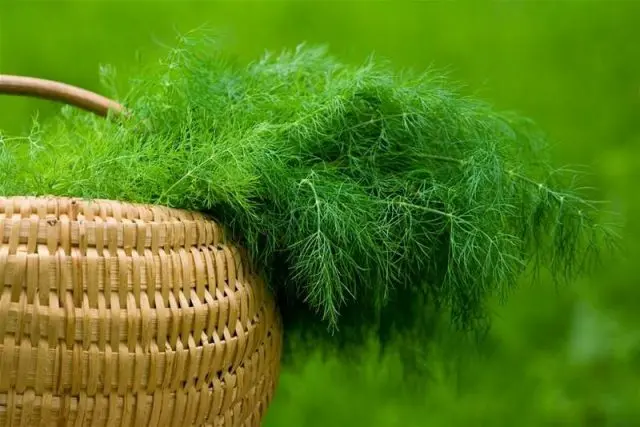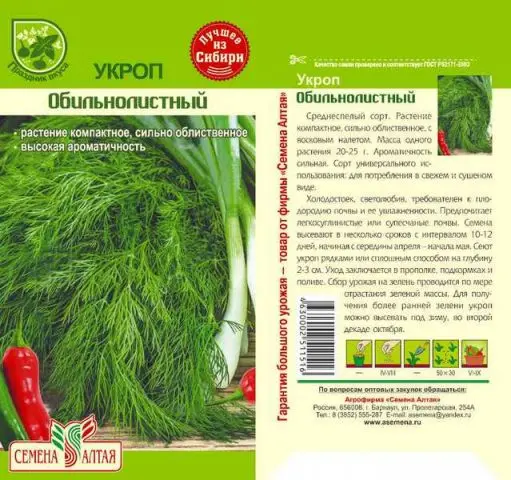Contents
Dill Abundantly deservedly got its name. The fragrant culture is unpretentious to growing conditions, besides it pleases with a large harvest. When planting even a minimal amount of seeds, it will turn out to make a good supply for the winter.

Description of the variety of dill Abundant-leaved
Dill Abundant-leaved – medium early variety. The bush is powerful. The socket is upright, slightly spreading. The foliage is large, rich green with a waxy coating. The length of the shoots is 28-36 cm. The form is strongly dissected. Greens are juicy and tender. Differs in slow stem formation. Also, the variety has a late initiation of inflorescences. The umbrella is medium tall, convex.
The plant has a strong aroma. It is used for salting, freezing, drying, cooking seasonings and conservation. Young sprouts are consumed freshly picked.
Productivity
The full cycle from planting to harvesting dill of the Abundant-leaved variety is 35-40 days. The first shoots appear 10-14 days after sowing seeds. Blooms on the 70th day.
From one plant you can collect 20-25 g of greens. Productivity 3-3,5 kg per 1 square. m. The volume of collected greenery can be affected by untimely, poor watering and heat. With a lack of moisture, especially in summer, growth slows down, shoots turn yellow. Cold weather will also negatively affect the growth of fragrant grass. If the soil has not warmed up completely, you will not have to count on a quick spitting of the seeds.
Stability
Dill cultivar Abundant-leaved is a moisture-loving plant. Therefore, it is bad to endure periods of drought. Does not like even slight frosts. Young shoots turn black, immediately wither. However, disease resistance is high.
Advantages and disadvantages
A photo of dill of the Abundant-leaved variety gives a visual representation of the plant. Feedback from experienced gardeners will help identify the strengths and weaknesses of a herbaceous crop.
Pros:
- juicy and fragrant greens;
- universal application;
- long term storage;
- undemanding in the process of growing;
- good yield.
Minus – intolerance to frost. Even a slight drop in temperature can cause the death of an entire plantation.

Rules of landing
Dill varieties Abundant-leaved are sown directly in open ground. Well-lit beds are suitable for planting. The spice can coexist with any garden crops, except for celery. It is undesirable to plant next to this vegetable.
Seed germination occurs at a temperature of + 3 °C. However, knowledgeable summer residents claim that the maximum growth of a plant is possible only at + 16-18 ° С. Prefers light loamy, sandy, neutral soils. Categorically does not accept an acidic environment. The selected area is pre-fertilized with manure, superphosphate, potassium salt.
The description states that it is necessary to sow dill of the Abundant-leaved variety in April-May, when the soil warms up to the desired temperature. Sow on moistened beds without embedding, but with obligatory mulching with a peat layer of 2 cm. The distance between the seeds is 5 cm, the immersion depth is 2 cm. It is optimal to sow dill Abundant-leaved in rows so that it is easy to thin out later. To obtain early greens, the spice can be planted before winter.
Cultivation of dill Abundant
It is easy to grow dill of the Abundant-leaved variety with minimal labor costs.
- It is necessary to thin out the rows as soon as the seedlings begin to grow. Space is needed for full development.
- The distance between plants is at least 5 cm.
- Constantly remove weeds that drown out young greens.
- Be sure to carry out water procedures. Watering dill Abundant is necessary every or every other day, depending on weather conditions.
- If there is a possibility of night frosts, it is better to cover the greens with a film. Even a slight decrease in temperature can lead to crop loss.
Diseases and pests
Dill of the Abundant-leaved variety rarely gets sick, but ailments still occur. Possible diseases of a fragrant plant:
- powdery mildew;
- downy mildew;
- fusarium wilt;
- cercosporosis
It does not recommend the use of chemicals due to the use of fresh dill. It is advisable to carry out preventive treatment of planting material. To prevent the occurrence of diseases, dill seeds of the Abundant-leaved variety are soaked in warm water or disinfected with a solution of potassium permanganate. Such measures will minimize the risk of infection.
Conclusion
Dill Abundant-leaved – medium early variety. Suitable for outdoor cultivation. You can grow at home on the windowsill so that in winter there is greenery on the table. If you don’t want to mess around or there is no possibility for indoor cultivation, it is harvested for future use. One has only to dry, freeze or pickle a fragrant plant.









